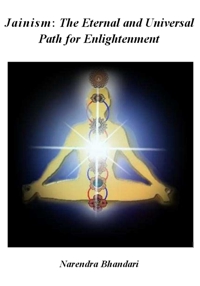Jainism is based on the five pillars of Ātmavād, Anekāntavād, Karmavād, Kriyāvād and Lokavād. Of these, Anekāntavād (true nature of things) and Lokavād (cosmology) come well within the purview of science and therefore Jainism is considered to have scientific foundation. Jainism thus considers matter and universe as real and not illusory, as some other faiths claim. This book is an attempt to identify common concepts between Jainism and various aspects of modern science.
The basic concept on which Jainism has developed its procedures is that humans have unique capabilities and, of all the sentient beings, only humans have the capability of attaining enlightenment. It is believed that the human birth results after lots of good karmas or punyas are accumulated in the previous births and this opportunity should be used for striving for attaining Mokṣa. According to modern science, all living beings have the capability of drawing energy from the environment at the physical level. All physical and chemical processes, occurring in isolation, result in increase in entropy. Although this law, known as the second law of thermodynamics remains valid for any biological system considered together with its environment, in "isolated" living systems, per say, the entropy decreases, that is, it physically draws energy from the environment.
The fossil record of species shows that life has gone through Darwinian evolution of natural selection from very primitive conscious algal form to humans which have the highest level of consciousness. In this chain of evolution, there were two major and abrupt revolutions: the first one occurred about 600 million years ago when mobile forms of life evolved. Till then the evolution was through transmutations based on environmental interaction. The second revolution occurred recently, about 200000 years ago, with the emergence of homo sapiens. Jainism proposes that besides the physical level where all living beings interact with environment, humans can draw energy at mental and consciousness level. Secondly they can enhance their consciousness level at will, by practicing certain procedures.
Enlightenment implies development of several faculties. Bhagvān Mahāvir, when he attained enlightenment, developed four main faculties: infinite potency (Anant Virya), infinite consciousness (Anant Chaitanya), infinite wisdom (Anant Jnān) and infinite bliss (Anant Sukh). Although all these four appeared at once, the first two, anant Virya and Anant chaitanya appear to be the cause and Anant Sukh and Anant Jnān are the consequences. Anant Virya requires infinite potency and its source must be the whole cosmos which is full of energy. Various sources of energy around us are the earth and its biosphere, sun, galaxy, cosmic rays etc. Bhagvān Mahāvir has shown us procedures to get or draw bio-energy from the biosphere by practicing non-violence and other forms of energy through meditation and tapasya. The basic law of physics is that energy flows from higher level to lower levels and therefore these procedures are meant to bring us down to the lowest energy levels where the energy from various sources starts flowing in. Energy of a thought is enough to raise the energy level above the environmental energy level and therefore one has to go to the state of no mind (no thought) to receive any energy. When any form of doubt, attachment, anger, greed, and pride fully subsides then environmental energy starts flowing in. The cosmos is full of energy. There are energy centres in the environment, such as mountain tops, temples, trees and water reservoirs which can transmit energy to humans and there are receptive centres in the body which can receive such energy. We still do not know the form in which this energy flows in but a guess is that it must be in a form of particles hitherto not discovered by physics. Meditation also increases the consciousness level to higher state. Thus Jainism prescribes a path to enhance the energy and consciousness levels by certain practices. Humans are the only species who can sit in isolation and increase their consciousness level, albeit in infinitesimal steps, unlike other species.
If we look at the history of the mankind and leave aside small hiccups, a certain direction of progress becomes clear. The humanity is moving towards freedom of all kinds, the ultimate aim being freedom from the cycles of birth. This freedom has to be preceded by freedom from mind, which in turn will be preceded by freedom from various other factors. The first revolution was the agriculture revolution to make humanity free of hunger and less dependent on nature. Then came the industrial revolution which brought in automation which provided material facilities and comforts and made us free from the worry of things of daily use. This was followed by the communication revolution to make it easy for us to communicate and learn from each other. The knowledge revolution is currently in progress with information easily accessible. This will be followed by social freedom, the most difficult of all, because we are intricately bound by social, family and personal traditions and mindset. This will soon be followed by revolution in thought and in consciousness level. We are inevitably moving in that direction. These revolutions are all recent phenomena over the past 10,000 or 20000 years and they are occurring progressively rapidly, from millennia to century and then to decadal scale, leaving us in no doubt in which direction the nature is evolving and wants us to evolve. Jainism and Buddhism are surely going to be the light houses for the next revolution. This is the underlying approach taken in this book. Although in this book Jainism has been considered in detail, the procedures are applicable to any body and one is not supposed to take anything as a matter of faith but is encouraged to weigh everything scientifically before accepting it. Part 1 of the book deals with the basic concepts of Jainism and part 2 deals with various aspects where there possibly is some overlap between science and Jainism. Much research will be required to prove if the various points raised are scientifically correct or require critical evaluation. If this approach is validated with open mind, the efforts in compiling this book will be deemed worthwhile.
 Prof. Dr. Narendra Bhandari
Prof. Dr. Narendra Bhandari
